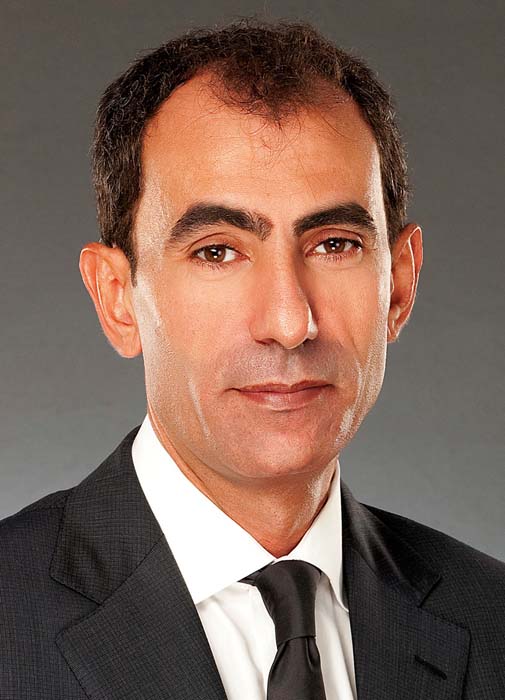|
The Unsweetened Truth
Yosri Fouda (MA '92) strives to maintain journalistic
balance and objectivity
 Photographed by Adel Mobarez/ONTV
As tensions were on the rise
throughout the Egyptian
uprising, journalists found
their task more challenging than usual.
Capturing events proved to be a real
issue, with photographers and reporters
facing threats of assault, detention and
having their equipment confiscated and
bureaus shut down. However, for TV
journalist Yosri Fouda (MA '92), the
biggest challenge was the ability to
truthfully convey events to the viewer.
"As a journalist, you discover things
as you go on, and you endeavor to
present views and not tell the audience
what to think," said Fouda. "I made it
clear that if we don't follow the
professional path in telling the truth,
then I'm not in. I wouldn't risk my
reputation and career. ... When
I'm in front of the camera, I try
to set my beliefs aside so that I
can serve viewers in the best
way possible by presenting the
best angle to the issue. Off
camera, on Twitter and
Facebook, my stances are clear."
Fouda is a graduate of the
Kamal Adham Center for
Journalism Training and
Research. Born in Egypt, he
initially worked for BBC,
covering escalating events in
Bosnia. In 1996, he joined Al
Jazeera network and played an
instrumental role in uncovering
secrets behind the 9/11 terrorist
attacks. He works for the independent
Cairo-based channel ONTV, owned by
Egyptian businessman Naguib Sawiris.
He is the co-author of Masterminds of
Terror: The Truth Behind the Most
Devastating Attack the World Has Ever
Seen (2003, Arcade Publishing).
Fouda believes that new media had a
tremendous effect in shaping history.
"Facebook, Twitter and the Internet in
general did not make the revolution,
but rather facilitated it," he said. "Media
coverage exposed people and showed
where they stood. The presence of
international media on the ground was
important, given Egypt's weight, but
credit must go to the people of Egypt."
While the accomplishments of the
revolution were remarkable, Fouda
believes much remains to be done to
bring Egypt to the status it truly
deserves. "The small dream of most
Egyptians now is education, healthcare,
not being intimidated by police officers
and for justice to be served. It sounds
easy, but will be very difficult because
the main nerves of the regime are still
in place," he said. "I'm an advocate of
open and liberal societies as well as
accountability. I'm aware of the fact that
democracy in the Western sense is not
applicable here, but I'm very much for
sticking to some basic concepts such as
accountability, true freedom of speech,
political participation, and improving
education and other core services."
Looking at the way forward for
Egyptian media, Fouda believes that a
great first step was accomplished with
the dissolution of the Ministry of
Information, although skepticism
remains about having a military officer
oversee its functions. "I hope that this is
only a transitional period, and I hope
for a body of non-political professionals
to take over," he said. "The catastrophe
of national newspapers and state TV for
the last 30 or 40 years was because
everybody who worked for them had
the ruler in mind in everything they
reported on. You should always ask
yourself if your true aim is to give
rightful service to the people. Breaking
this mentality and moving on to a new
era is absolutely crucial."
By Ghaydaa Fahim
|
